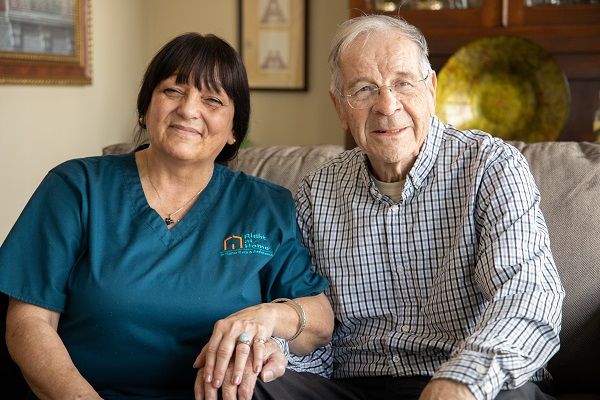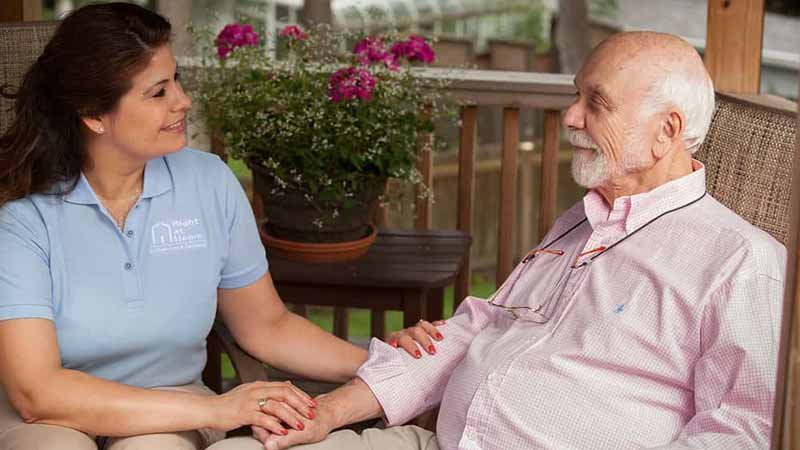

Living at Home With Dementia
The Alzheimer’s Association’s “2022 Alzheimer’s Disease Facts and Figures” report reveals that 6.5 million people in the U.S. are living with Alzheimer’s disease. More than 10% of people aged 65 and older have Alzheimer’s or another type of dementia, including frontotemporal dementia, Lewy body dementia, vascular dementia, and combinations of dementia types.
As their care needs increase, people with dementia may choose to live in a memory care facility. Most prefer to remain in their own homes as long as possible, among familiar surroundings and their established support system.
But this requires care support, which often is provided by spouses, adult children, or other family and friends. Today, 11 million people are providing this care. They help loved ones with self-care, such as bathing, dressing and using the toilet. They pay bills and handle other paperwork. They coordinate their loved one’s medical care. They provide “emotional labor,” keeping their loved one’s spirits up and depression at bay while coping with personality and behavior changes caused by the disease.
If you are a family caregiver for a loved one who is living with dementia, here are things to know:
Learning about your loved one’s condition will help you adjust. It’s important to know that changes in your loved one’s personality and behavior, such as wandering, aggression, confusion, anxiety and sleep problems, are caused by the disease. Adapting the way you spend time with your loved one can help you manage and cope with those changes. Ask your loved one’s health care provider for suggestions.
People with dementia need appropriate mental stimulation. Studies show this lessens symptoms and might slow the progression of memory loss. Adapt activities your loved one enjoys, and find new ones. Locate dementia-friendly programs in your community. Listening to music, looking at a photo album, and even doing housework together can be pleasant ways to spend time.
Check out dementia-friendly products. There are puzzles, crafts and games geared for the changing needs of people with dementia. Music and photo programs that tap into a person’s earlier years can spark memories and create pleasure. Weighted sensory blankets made with objects and textures are soothing for people in later stages of dementia.
Help your loved one remain physically active. Exercise is important for your loved one’s health. As their condition changes, adapt activities to be safe and appropriate. You can go for walks, dance or do simple workouts together. Household tasks such as dusting and sweeping also provide physical exercise.
Provide personal care with sensitivity. Your loved one may need help with bathing, dressing, grooming and oral health care. It can help to be matter of fact about these tasks. Be respectful and tell your loved one what you are going to do, step by step.
Help your loved one at mealtime. Dementia doesn’t alter your loved one’s dietary needs, but it does pose challenges to optimum nutrition. Your loved one may have decreased appetite and forget to eat. Engage them by letting them help you prepare the meal, and eat with them—dining with a companion is an appetite booster. If your loved one is having trouble chewing and swallowing, talk to their health care provider.
In communication, meet your loved one where they are. In earlier days, dementia care focused on “reality orientation.” But now, the emphasis is on validating the person’s own interpretation of things, rather than correcting them. Listen to your loved one’s thoughts and recollections, even if they aren’t accurate. Gauge whether your loved one responds better to open-ended or “yes/no” questions. Focus on their feelings, rather than their words.
As the disease progresses and your loved one’s condition changes, so will your time together. Your loved one will require more care support and need more supervision. Near the end of life, they may not be able to communicate and will require assistance for all activities.

Help is available for dementia caregivers.
While many caregivers say caring for their loved one is rewarding, dementia caregiving is hard work, both physically and emotionally. It often affects the caregiver’s career, other family relationships, and their physical and cognitive health. And many family caregivers are at an age when they need care themselves.
If you are a family caregiver for a loved one who has dementia, it’s important to access support services as your loved one’s condition progresses. These support services might include:
- Public senior-support services
- Home safety modifications
- Support groups and counseling
- Education and advocacy
- Aging life care professionals (geriatric care managers)
- Respite care
Family and friends also can help. And according to the Alzheimer’s Association report, professional in-home caregivers “play important roles in delaying nursing home placement and reducing repeat hospitalizations.”
Professional in-home caregivers provide companionship, supervision, and an array of supports to create an environment that meets the needs of the client and family. Choose a caregiver who is trained in memory care.
Professional in-home caregivers help in many ways:
Keeping the home safe and suitable for the client’s needs. Caregivers can provide housekeeping and laundry. They can remove fall hazards, and provide a watchful presence while still maintaining the client’s sense of independence.
Hygiene support and personal care. Sensitive to preserving the client’s dignity and to normalizing family relationships, trained professional caregivers can assist with toileting and incontinence care, bathing, dressing and grooming.
Meal planning and preparation. Professional in-home caregivers can shop for groceries and prepare meals and snacks as recommended by the client’s health care provider. They can provide supervision, assistance and company at mealtime.
A day filled with meaningful activities. Exercise, mental stimulation and spending time with other people all provide a sense of well-being for people with dementia, and can help lessen troublesome symptoms. Working with family, the caregiver and client can plan to do household chores together, listen to music, play games, work in the garden or go for walks.
Health care reminders and transportation. Many people who are living with dementia have additional chronic health conditions, such as heart disease, diabetes, arthritis or osteoporosis. In-home caregivers can provide health and medication reminders, pick up prescriptions, and transport clients to the doctor’s office and other health care appointments.
Respite for family caregivers. Professional in-home care allows family to take time off for their own needs, confident that their loved one is well cared for. With the professional caregiver providing basic day-to-day care, the person with dementia and family are freed to spend their time together doing things they enjoy.
Right at Home’s professional caregivers are trained to understand and meet the needs of clients who are living with dementia. Use our Location Finder to contact your local Right at Home* today and ask for a FREE in-home consultation. Also, be sure to download our Dementia and Cognitive Change Guide to get tips and techniques that can help you find new ways to connect with your loved one.
*Home care services vary by location.







